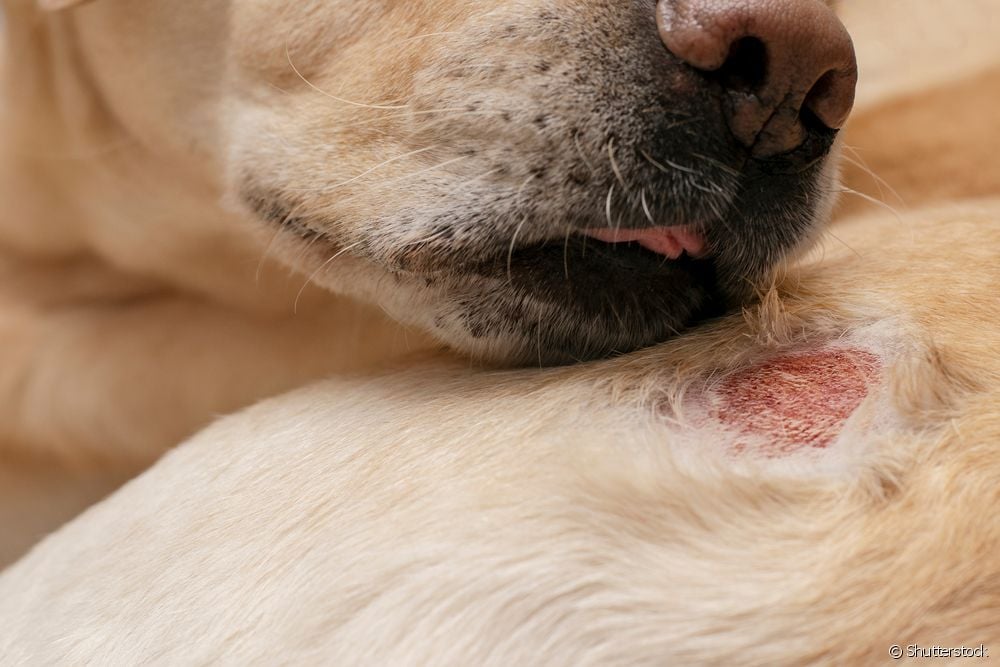Dermatitis in dogs due to parasite bites: what to do?

Table of contents
Dog dermatitis is a more common canine skin disease than it seems, especially when the cause is the bite of some parasite, such as fleas, ticks and even lice. But unlike canine atopic dermatitis, this type of inflammation on the dog's skin can be easier to treat, in addition to being less painful for the pet. Next, here's how to take care of dermatitis caused bycontact with parasites.
How to care for the dog with parasite dermatitis
Dermatitis, both in dogs and humans, is a type of allergic reaction of the body against some unknown substance or that is aggressive to the skin, causing inflammation. Normally, only contact with a parasite can generate this reaction. But when an insect bite occurs, the chances of the dog developing dermatitis are greater.
See_also: Dog peeing with blood: when to worry?To relieve the symptoms of canine dermatitis, home treatment can help. At home, it is recommended to use shampoos indicated to fight dermatitis, and this care alone relieves the pet's itching! But some homemade recipes, such as fennel tea, aloe or coconut oil, applied alone with the aid of a cotton pad on the wound site, can also be recommended by a doctor.However, it is important to ensure that the dog cannot lick the area being treated, so keep an eye on the pet or put an Elizabethan collar on it.
See_also: What is the right dog flooring? Understand how slippery flooring affects your pet's jointsAttention should also be paid to the use of some more aggressive substances, such as apple cider vinegar, baking soda or salt, as these products can worsen inflammation and cause more pain to the furry one. It is also good to visit the veterinarian to check the need for anti-inflammatory use, either in ointment or tablet. And to prevent dermatitis caused by parasite bites, keep the dog and the house clean.free and protected from fleas and ticks, with plenty of pet hygiene and household cleanliness.

Types of dermatitis that affect dogs
The most common dermatitis is caused by contact with parasites, but some other external agents such as pollen, dust, bacteria and fungi can also trigger the condition. These are some types of dermatitis in dogs:
- Canine pyoderma: is a type of dermatitis caused by a bacterial infection on the dog's skin and can be superficial or deep. The host bacterium is called Staphylococcus pseudintermedius, and it is naturally part of the canine organism, acting against some other inflammations and skin lesions. However, when reproduced in excess, it can result in dermatitis.
- Psychogenic dermatitis: this is generated exclusively by psychological and environmental factors, where the dog has an excessive licking that turns into dermatitis. Changes, arrival of other pets or a baby in the family or any other stressful situation can cause the dog to have this reaction. It can be prevented with a lot of affection and care!
- Wet de rmatitis in dogs: this is one of the most painful and its characteristic is the wetness of the infected site. It develops through trauma to the skin and can spread rapidly throughout the animal's body.
- Canine atopic dermatitis: Some breeds are predisposed to developing this type of dermatitis, requiring constant treatment against the coming and going of inflammation.
In addition to these, other factors, such as the female dog's hormones, fungi present on the wall of the house and even allergy to some food can also trigger canine dermatitis. All have itching and canine discomfort as symptoms, in addition to redness of the skin and excessive licking of the pet. The dog may also have an apathetic behavior and even lack of appetite.
Some breeds are more prone to canine dermatitis
In the case of atopic dermatitis in dogs, unfortunately some breeds can naturally develop the disease. One of the negative characteristics of the Shih Tzu, for example, is that this is a breed prone to developing atopic dermatitis. The Lhasa Apso shorn or not can also have this condition. And other breeds such as the French Bulldog, Yorkshire dog, Pug, Labrador, among many others, can have it.In fact, no breed escapes canine dermatitis, so it is always good to be very careful with the bathing and grooming of the dog, especially the furry ones.

